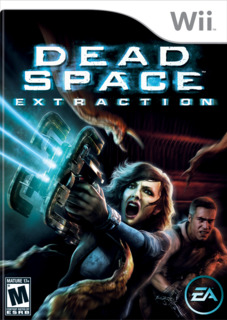Extraction is the perfect example of the benefits a console environment can bring to a genre mostly dedicated to arcades
The core component that makes Dead Space: Extraction rise above the competition is its acknowledgement that it is a game made to be played at home. While some on-rails titles embraced their simplistic nature, Extraction tries to take advantage of the environment where it is meant to be played, without leaving behind the genre's most important characteristics. The main point where it becomes clear that the game has gained in quality and value due to its migration is the emphasis on story. If on an arcade environment characters and plot fall victims to the overwhelming importance of scoring and shooting ridiculous waves of enemies, at home players can take their time, sit back and enjoy the plot underlying all the shooting.
Serving as a prequel to the original Dead Space, Extraction begins when a group of miners are extracting a mysterious artifact from a human colony in the planet Aegis VII. Things go awry when the members of the crew begin suffering from hallucinations caused by the object, and start behaving wildly and violently. Later, the bizarre infection has spread through the entire colony, causing most of the population to turn into a creepy blend of zombies and aliens, and the few who have survived start planning a desperate escape. Through the ten missions and six-to-eight hours of gameplay, the story is slowly developed and characters are built into respectable levels, giving Extraction a whole new dimension in addition to the shooting and wandering through dark, silent and eerie corridors.
The second area on which the game is obviously influenced by its console nature is production. By locking players into a fixed path and allowing them to only move the reticule, the game producers gained the power equivalent to that of movie directors, and they fully take advantage of it. During the game, players will not feel like they are hostages to a brainless camera that follows a pre-determined path. Instead, they will truly feel like they are seeing the game through the character's eyes. The camera will occasionally move to the side when sudden noises are heard, it will look at a partner's direction when they say something or give an instruction and will move, shake and twist in impressive accordance to what goes on in the game.
That sole characteristic makes the whole experience extremely engaging, turning players into characters rather than viewers, and allowing developers to meticulously arrange the game so that it produced the desired effects and emotions on whoever is playing it. The emotional roller-coaster is nicely accentuated by the fact that, in doing away with freedom, the game gained a lot in graphical quality, hence making enemies, visual effects, character models and dark environments much more believable than they would have been in a free-roaming game that whose visuals were chained by the Wii's hardware. Producing games that attempt to be realistic on the Nintendo Wii has always been tricky, but Visceral Games came pretty close to nailing it perfectly.
The game presents great pacing throughout the adventure, alternating a few moments of straight action with slower tense segments, and punctuating them with the occasional cutscene or character development. The reasonably short duration of each of the ten episodes – every one of them lasts for about 40 minutes or so – makes the individual bits of the game very replayable, which goes along nicely with the game's long range of difficulties that go from Normal to the boldly titled Impossible. For those who are willing to dedicate themselves to the game more intensely, there are ten challenge mode levels, which focus on shooting and brutal combat instead and exclude any mention of the story, and the ability to play through the game cooperatively.
All in all, Dead Space: Extraction is definitely worth playing. It is rare to see a game that has the potential to change negative views on the genre that it belongs to, but Extraction is a game that deserves such a distinction. People who admire on-rails shooters will fall in love with how Visceral Games has taken advantage of the chance to expand the genre due to its transition to a home console, and those who have never really had much admiration for games of this kind will find, in the tense Extraction, the opportunity to learn to love them. Extraction pairs the simplicity of the on-rails gameplay with ambitious movie-like direction, thrills and a good deal of nice storytelling.

